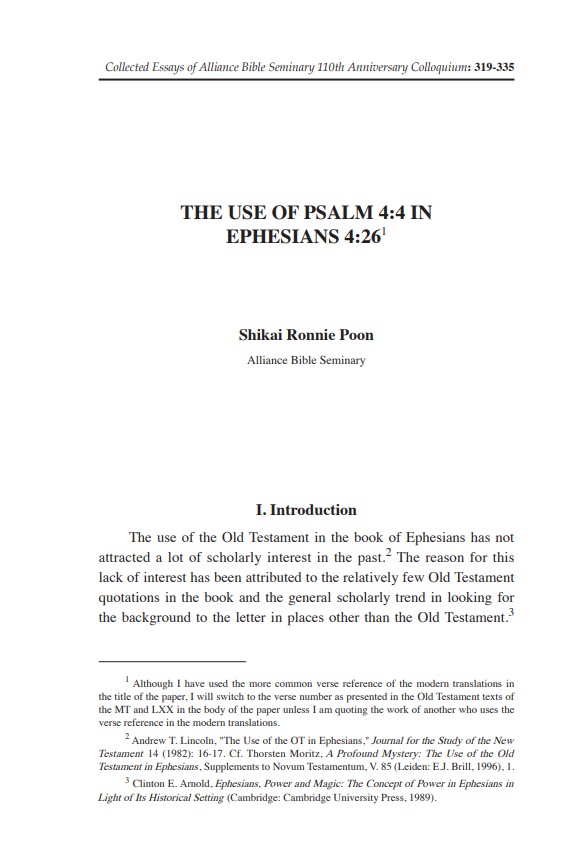THE USE OF PSALM 4:4 IN EPHESIANS 4:26/Shikai Ronnie Poon
Shikai Ronnie Poon
撮要
這文章研究以弗所書四章26節中對舊約的運用。在文中先簡單地簡介了這節在解釋上的文法問題,然後從以弗所書四章25至30節中對舊約的多次運用,推論這是作者有意的運用。文中跟着比較所引用的詩篇第四篇的經文傳統,指出MT與LXX可能是代表着兩種對這詩篇的不同解釋,而被以弗所書所引用的LXX版本,可能保存了一個可以進一步支持將以弗所書四章26節中的命令語氣動詞ojrgivzesqe,解釋為真正的命令。
ABSTRACT
This article studies the use of the Old Testament in the Ephesians 4:26. After a brief survey in the exegetical options for the difficult phrase expressed in Ephesians 4:26, this article argues from the series of Old Testament quotations and allusions in parenetic section of Ephesians 4:25-30 that the use of Psalm 4:4 is intentional. The study of the textual tradition of Psalm 4 then suggests that the MT and LXX represent two different interpretations of the Psalm in its context, and that the interpretation suggested from the LXX tradition that is quoted by Ephesians would offer support to see the imperative ojrgivzesqe in Ephesians 4:26 as a true command. Thus the study of the use of the Old Testament in this passage may offer additional argument in support of a purely grammatical-syntactical analysis.
原載於《教牧期刊》第27期及《建道學刊》第34期合刊(2010年7月),頁319-335。
作者簡介
潘仕楷
前聖經系副教授
最新文章
新手牧者研究計劃(三):新手牧者的身心靈狀態 / 盧慧儀
2025 年 11 月 19 日
【教牧退休】好好理財 退而不憂 / 林本利
2025 年 10 月 1 日
【教牧退休】生前身後的管理:平安三寶 / 陸文慧
2025 年 10 月 1 日
編輯精選
[電子書]困境與抉擇:「建道研究中心30週年誌慶」跨學科研討會論文集/廖炳堂、倪步曉主編
2025 年 1 月 2 日
從梧州到長洲:建道神學院125年的挑戰與恩典 / 陳智衡
2023 年 10 月 1 日
微小教會的見證/高銘謙
2023 年 6 月 1 日








